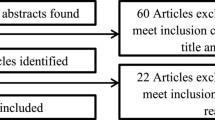Abstract
A growing body of research has demonstrated the effectiveness of integrating mental/behavioral healthcare with primary care in improving health outcomes. Despite this rich literature, such demonstration programs have proven difficult to maintain once research funding ends. Much of the discussion regarding maintenance of integrated care has been focused on lack of reimbursement. However, provider factors may be just as important, because integrated care systems require providers to adopt a very different role and operate very differently from traditional mental health practice. There is also great variability in definition and operationalization of integrated care. Provider concerns tend to focus on several factors, including a perceived loss of autonomy, discomfort with the hierarchical nature of medical care and primary care settings, and enduring beliefs about what constitutes “good” treatment. Providers may view integrated care models as delivering substandard care and passively or actively resist them. Dissemination of available data regarding effectiveness of these models is essential (e.g. timeliness of treatment, client satisfaction). Increasing exposure and training in these models, while maintaining the necessary training in traditional mental health care is a challenge for training at all levels, yet the challenge clearly opens new opportunities for psychology and psychiatry.
Similar content being viewed by others
References
American Academy of Family Physicians. (2008). Joint principles of the patient-centered medical home. Delaware Medical Journal, 80, 21–22.
American Psychiatric Association. (2005). APA gold award: Improving treatment engagement and integrated care of veterans. Psychiatric Services (Washington, DC), 10, 1306–1308.
Bauer, M. S., Mcbride, L., Williford, W. O., Glick, H., Linosian, B., Altshuler, L., et al. (2006a). Collaborative care for bipolar disorder: Part 1. Intervention and implementation in a randomized effectiveness trial. Psychiatric Services (Washington, DC), 57, 927–936. doi:10.1176/appi.ps.57.7.927.
Bauer, M. S., Mcbride, L., Williford, W. O., Glick, H., Linosian, B., Altshuler, L., et al. (2006b). Collaborative care for bipolar disorder: Part 2. Impact on clinical outcome, function, and costs. Psychiatric Services (Washington, D.C.), 57, 937–945. doi:10.1176/appi.ps.57.7.937.
Blount, A. (2003). Integrated primary care: Organizing the evidence. Families, Systems and Health, 21, 121–133. doi:10.1037/1091-7527.21.2.121.
Bray, J. R. (2006). Clinical competencies for practicing in primary health care: Competencies. The Register Report, Fall. Downloaded June 11, 2008. http://nationalregister.org/TRR_online_fall2006_Bray.html.
Butler, M., Kane, R. L., McAlpine, D., Kathol, R. G., Fu, S. S., Hadorn, H., et al. (2008). Integration of mental health/substance abuse and primary care. Agency of Healthcare Research and Quality Publication 09-E003. Rockville, MD.
Carels, R. A., Musher-Eizenman, D., Cacciapaglia, H., Perez-Benetiz, C. I., Christie, S., & O’Brien, W. (2004). Psychosocial functioning and physical symptoms in heart failure patients: A within-individual approach. Journal of Psychosomatic Research, 56, 95–101. doi:10.1016/S0022-3999(03)00041-2.
deGruy, F. V. (2006). A note on the partnership between psychiatry and primary care. American Journal of Psychiatry, 163, 1487–1489.
Dietrich, A. J., Oxman, T. E., Williams, J. W., Schulberg, H. C., Bruce, M. L., Lee, P. W., et al. (2004). Reengineering systems for the treatment of depression in primary care: A cluster randomized controlled trial. British Medical Journal, 329, 602–608.
Doherty, W. J., McDaniel, S. H., & Baird, M. A. (1996). Five levels of primary care/behavioral healthcare collaboration. Behavioral Healthcare Tomorrow, 5, 25–28.
Freeman, D. S. (2007). Blending behavioral health into primary care at Cherokee Health Systems. Working together: Integrated health care. The Register Report, Fall. Downloaded June 11, 2008. http://nationalregister.org/TRR_online_fall2007_Freeman.html.
Garcia-Shelton, L. (2002). Meeting US health care needs: A challenge for psychology. Professional Psychology Research and Practice, 37, 676–682.
Goldberg, R. J. (1999). Financial incentives influencing the integration of mental health care and primary care. Psychiatric Services, 50, 1071–1075.
Goldberg, R. J. (2002). Behavioral/primary care integration: A failed venture. Behavioral Healthcare Tomorrow, 11, 8–9.
Grembowski, D. E., Martin, D., Patrick, D. L., Diehr, P., Katon, W., Williams, B., et al. (2002). Managed care, access to mental health specialists, and outcomes among primary care patients with depressive symptoms. Journal of General Internal Medicine, 12, 258–269.
Haas, L. J., & deGruy, F. V. (2005). Primary care, psychology and primary care psychology. In L. J. Haas (Ed.), Handbook of primary care psychology (pp. 5–19). New York: Oxford University Press.
Hedrick, S. C., Chaney, E. F., Felker, B., Liu, F., Hasenberg, N. P., Heagerty, J., et al. (2003). Effectiveness of collaborative care depression treatment in Veterans’ Affairs primary care. Journal of General Internal Medicine, 18, 9–16.
Hegel, M., Unutzer, J., Tang, L., Arean, P. A., Katon, W. J., Hitchcock-Noel, P., et al. (2005). Impact of comorbid panic and posttraumatic stress disorder on outcomes of collaborative care for late-life depression in primary care. American Journal of Geriatric Psychiatry, 13, 48–58.
Institute of Medicine Board on Health Care Services. (2006). Improving the quality of health care for mental and substance-use conditions. Quality Chasm Series. Washington, DC: National Academies Press.
Katon, W. J., Schoenbaum, M., Fan, M. Y., Callahan, C. M., Williams, J., Jr., Hunkeler, E., et al. (2005). Cost-effectiveness of improving primary care treatment of late-life depression. Archives of General Psychiatry, 62, 1313–1320.
Kessler, R. (2005). Treating psychological problems in medical settings: Primary care as the defacto mental health system and the role of hypnosis. International Journal of Clinical and Experimental Hypnosis, 53, 290–305.
Kessler, R. (2008). The difficulty of making psychology research and clinical practice relevant to medicine: Experience and observations. Journal of Clinical Psychology in Medical Settings, 15, 65–72.
Kessler, R. C., Berglund, P., Demler, O., Jin, R., Koretz, D., Merikangas, K. R., et al. (2003). The epidemiology of major depressive disorder: Results from the national comorbidity survey replication (NCS-R). Journal of the American Medical Association, 289, 3095–3105.
Kilbourne, A. M., Pincus, H. A., Schutte, K., Kirchner, J. E., Haas, G. L., &. Yano, E. M. (2006). Management of mental disorders in VA primary care practices. Administration and Policy in Mental Health and Mental Health Research, 33, 208–214.
Lipowski, Z. J. (1967). Review of consultation psychiatry and psychosomatic medicine: II. Clinical aspects. Psychosomatic Medicine, 29, 201–224.
Lipowski, Z. J. (1974). Consultation-liaison psychiatry: An overview. American Journal of Psychiatry, 131, 623–630.
Murray, M., & Berwick, D. (2003). Advanced access: Reducing waiting and delays in primary care. Journal of the American Medical Association, 289, 1035–1040.
Ng, T. P., Niti, M., Tan, W. C., Cao, Z., Ong, K. C., & Eng, P. (2007). Depressive symptoms and chronic obstructive pulmonary disease: Effect on mortality, hospital readmission, symptom burden, functional status, and quality of life. Archives of Internal Medicine, 167, 60–67.
Oslin, D. W., Ross, J., Sayers, S., Murphy, J., Kane, V., & Katz, I. (2006). Screening, assessment and management of depression in VA primary care clinics: The Behavioral Health Laboratory. Journal of General Internal Medicine, 21, 46–50.
Oxman, T. E., Dietrich, A. J., & Schulberg, H. C. (2003). The depression care manager and mental health specialist as collaborators within primary care. American Journal of Geriatric Psychiatry, 11, 507–516.
Peryrot, M., & Rubin, R. R. (2007). Behavioral and psychosocial interventions in diabetes: A conceptual review. Diabetes Care, 30, 2433–2439.
Pomerantz, A. S., Cole, B. H., Watts, B. V., & Weeks, W. B. (2008). Improving efficiency and access to mental health care: Combining integrated care and advanced clinical access. General Hospital Psychiatry, 30, 546–551.
Regier, D. A., Narrow, D. E., Rae, D. S., Manderscheid, R. W., Locke, B. Z., & Goodwin, F. K. (1993). The de facto U.S. mental and addictive disorders service system: Epidemiologic catchment area prospective 1-year prevalence rates of disorders and services. Archives of General Psychiatry, 50, 85–94.
Schulberg, H. C. (2001). Treating depression in primary care practice: Applications of research findings. Journal of Family Practice, 50, 535–537.
Simon, G. E., Katon, W. J., VonKorff, M., Unutzer, J., Lin, E. H. B., Walker, E. A., et al. (2001). Cost-effectiveness of a collaborative care program for primary care patients with persistent depression. American Journal of Psychiatry, 158, 1638–1644.
Skultety, K. M., & Zeiss, A. (2006). The treatment of depression in older adults in the primary care setting: An evidence based review. Health Psychology, 25, 665–674.
Sledge, W. H., Moras, K., Hartley, D., & Levine, M. (1990). Effect of time limited psychotherapy on dropout rates. American Journal of Psychiatry, 147, 1341–1347.
Smith, G. R., Monson, R. A., & Ray, D. C. (1986). Psychiatric consultation in somatization disorder: A randomized controlled study. New England Journal of Medicine, 314, 1407–1413.
Stanton, A. L., Revenson, T. A., & Tennen, H. (2007). Health psychology: Psychological adjustment to chronic illness. Annual Review of Psychology, 58, 565–592.
Strosahl, K. (1996). Mind and body: Primary mental healthcare: New model for integrated services. Behavioral Healthcare Tomorrow, 5, 93–95.
Van Voorhees, B. W., Wang, N. Y., & Ford, D. E. (2001). Managed care and primary care physicians’ perception of patient access to high quality mental health services. Journal of General Internal Medicine, 16(Suppl 1), 200.
Van Voorhees, B. W., Wang, N. Y., & Ford, D. E. (2003). Managed care organizational complexity and access to high quality mental health services: Perspective of US primary care physicians. General Hospital Psychiatry, 25, 149–157.
Wagner, E. H., Austin, B. T., & VonKorff, M. (1996). Organizing care for patients with chronic illness. Milbank Quarterly, 74, 511–544.
Wang, P. S., Demler, O., Olfson, M., Pincus, H. A., Wells, K. B., & Kessler, R. C. (2006). Changing profiles of service sectors used for mental health care in the United States. American Journal of Psychiatry, 163, 1187–1198.
Watts, B. V., Shiner, B., Pomerantz, A., Stender, P., & Weeks, W. B. (2007). Outcomes of a quality improvement project integrating mental health into primary care. Quality and Safety in Health Care, 16, 378–381.
Author information
Authors and Affiliations
Corresponding author
Rights and permissions
About this article
Cite this article
Pomerantz, A.S., Corson, J.A. & Detzer, M.J. The Challenge of Integrated Care for Mental Health: Leaving the 50 minute hour and Other Sacred Things. J Clin Psychol Med Settings 16, 40–46 (2009). https://doi.org/10.1007/s10880-009-9147-x
Received:
Accepted:
Published:
Issue Date:
DOI: https://doi.org/10.1007/s10880-009-9147-x




